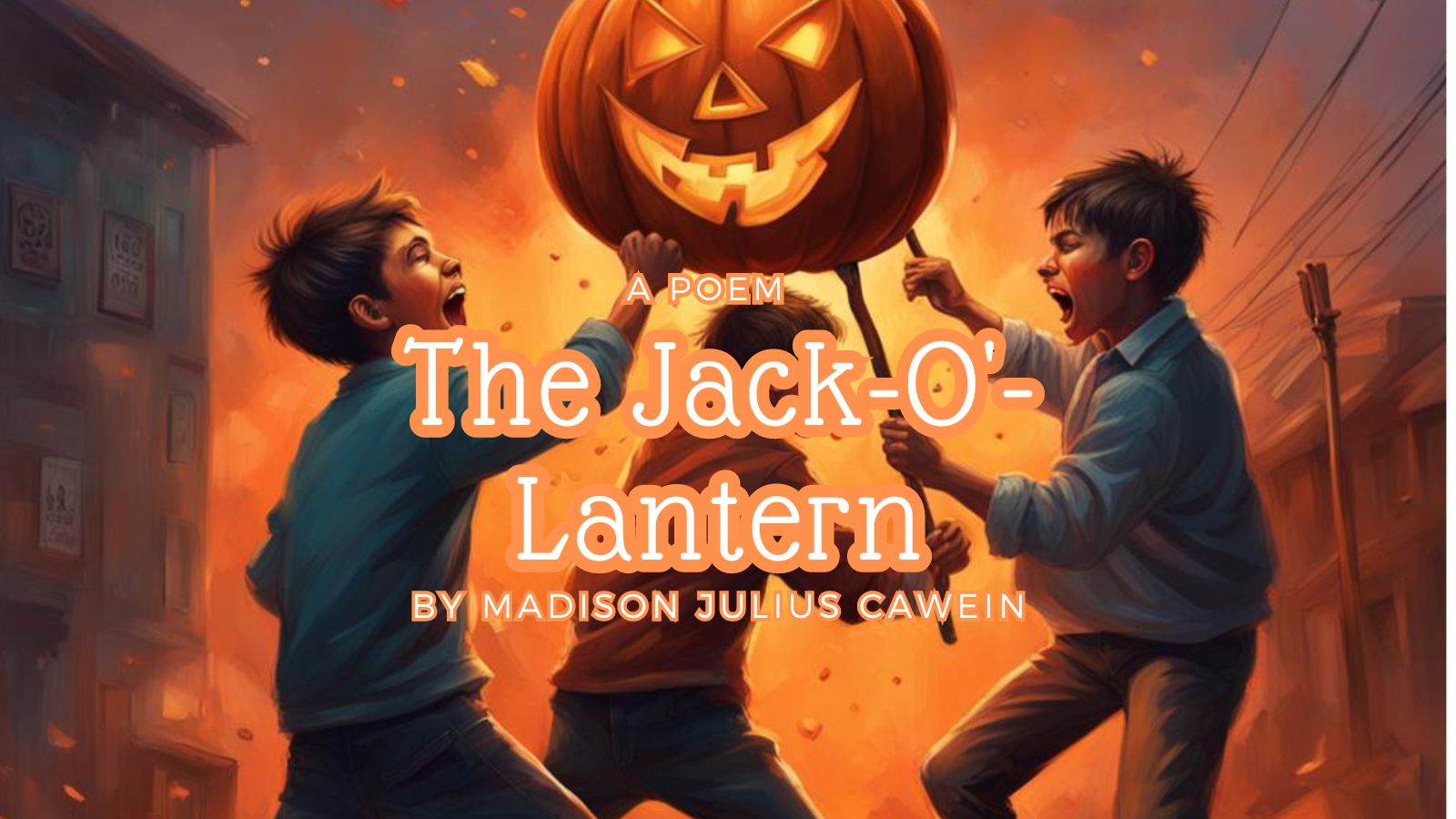The Jack-O’-Lantern
By Madison Julius Cawein
Last night it was Hallowe’en.
Darkest night I’ve ever seen.
And the boy next door, I thought,
Would be glad to know of this
Jack-o’-lantern father brought
Home from Indianapolis.
And he was glad. Borrowed it.
Put a candle in and lit;
Hid among the weeds out there
In the side lot near the street.
I could see it, eyes aglare,
Mouth and nose red slits of heat.
My! but it looked scary! He
Perched an old hat on it, see?
Like some hat a scarecrow has,
Battered, tattered all around;
And he fanned long arms of grass
Up and down above the ground.
First an Irish woman, shawled,
With a basket, saw it; bawled
For her Saints and wept and cried,
“Is it you, Pat? Och! I knew
He would git you whin you died!
‘Faith! there’s little change in you!”
Then the candle sputtered, flared,
And went out; and on she fared,
Muttering to herself. When lit,
No one came for longest while.
Then a man passed; looked at it;
On his face a knowing smile.
Then it scared a colored girl
Into fits. She gave a whirl
And a scream and ran and ran
Thought Old Nick had hold her skin;
And she ran into a man,
P’liceman, and he run her in.
But what pleased me most was that
It made one boy lose his hat;
A big fool who thinks he’s smart,
Brags about the boys he beat:
Knew he’d run right from the start:
Biggest coward on the street.
Then a crowd of girls and boys
Gathered with a lot of noise.
When they saw the lantern, well!
They just took a hand: they thought
That they had him when he fell;
But he turned on them and fought.
He just took that lantern’s stick,
Laid about him hard and quick,
And they yelled and ran away.
Then he brought me all he had
Of my lantern. And, I say,
Could have cried I was so mad.
###
Summary
The speaker describes the events of Halloween night after the speaker’s father brought home a jack-o-lantern. The boy next door borrowed the jack-o-lantern, lit a candle inside, and hid it in the weeds to scare people. It scared several passersby, including an old woman who thought it was someone she knew, a girl who had a fit, and a policeman who took the girl in. The jack-o-lantern also scared a boastful boy into losing his hat and running away. Finally, a crowd of kids attacked the jack-o-lantern, but the boy who borrowed it fought them off. He then returned what was left of the smashed pumpkin to the speaker, who was very upset about the destruction of the jack-o-lantern. The poem depicts the jack-o-lantern scaring people and leading to mischief on Halloween night.
Biography
Madison Julius Cawein was an American poet born in 1865 in Louisville, Kentucky. He was associated with the “Kentucky School” of writers and was known for his poetry featuring mystical themes of nature and mythology. Some of his notable published works include Blooms of the Berry (1898), Kentucky Poems (1900), Mystery and Romance (1901), and Myth and Romance (1908).
Cawein’s style was heavily influenced by the English Romantic poets like Keats and Shelley, with much of his poetry conveying a dreamy, romantic, and imaginative tone. He led a largely reclusive life, suffering from depression and alcoholism in his later years. Cawein died by suicide in 1914 at the age of 49.
At the peak of his career, Cawein was compared to renowned Romantic poets like Keats and Shelley. While mostly forgotten today, he was considered an influential regional American poet at the turn of the 20th century. His poem “The Vampire” is one example of his works dealing with supernatural subjects and themes. Though he died in obscurity, Cawein contributed a substantial body of mystical, nature-inspired poetry during his lifetime.
